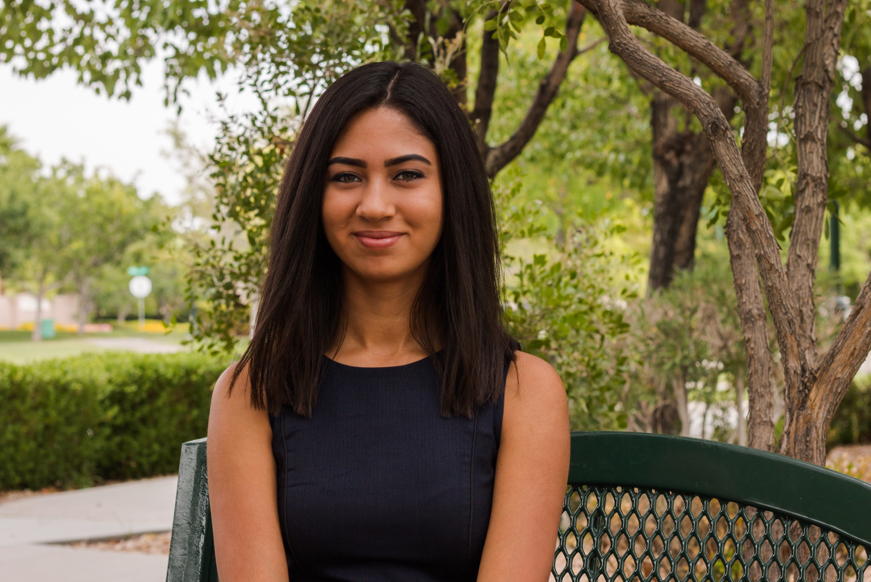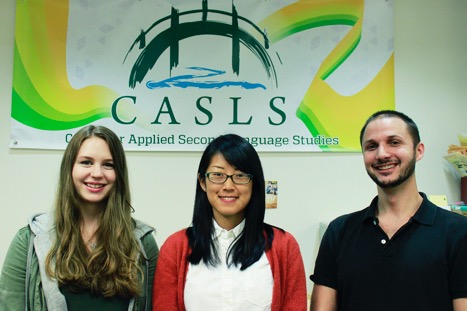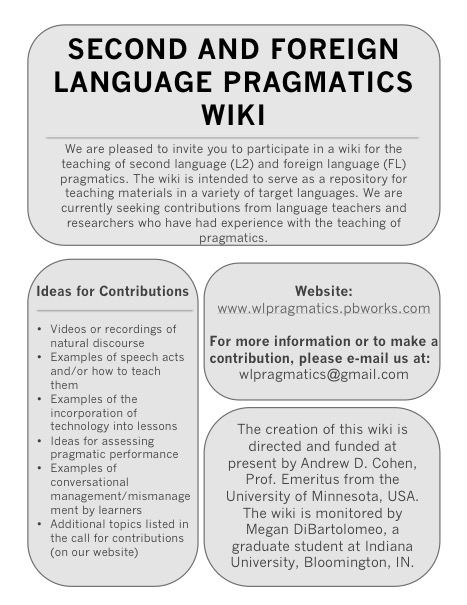Contents
Content Type: 1
Title: Real Life Tasks for the World Language Class
Body:
From http://teachinginthetargetlanguage.com/
French teacher Laura describes several different real-life tasks that students, especially high school and older, are likely to encounter in situations which require the use of their target language: finding a place to live, finding a job, applying to a college, applying for a visa, making a purchase, and seeking medical attention. Get ideas for having your students navigate these tasks in class here: http://teachinginthetargetlanguage.com/real-life-tasks-for-the-world-language-class/
Source: Teaching in the Target Language
Inputdate: 2017-09-28 15:11:17
Lastmodifieddate: 2017-10-02 03:55:21
Expdate:
Publishdate: 2017-10-02 02:15:01
Displaydate: 2017-10-02 00:00:00
Active: 1
Emailed: 1
Isarchived: 0
Content Type: 1
Title: In-Class Flip: Sentence Types
Body:
From http://martharamirez.com.co/
In August Jeff Magoto presented information about in-class flips, in which students spend class time both getting instruction and applying what they’ve learned. You can read his Topic of the Week article here: http://caslsintercom.uoregon.edu/content/23624
In this recent blog post, Martha Ramirez describes how she took a boring topic (different sentence types) that only some of her students had a grasp on, and had students learn more and practice with an in-class flip: http://martharamirez.com.co/blog/how-i-in-class-flipped-a-boring-language-lesson/
Source: Martha Ramirez
Inputdate: 2017-09-28 15:11:59
Lastmodifieddate: 2017-10-02 03:55:21
Expdate:
Publishdate: 2017-10-02 02:15:01
Displaydate: 2017-10-02 00:00:00
Active: 1
Emailed: 1
Isarchived: 0
Content Type: 1
Title: Children’s Reading List: Different Styles, Different Children
Body:
Here is a reading list of children’s books about characters with a variety of learning styles, personality traits, and physical and learning disabilities: http://www.readingrockets.org/booklists/different-styles-different-children
Source: Reading Rockets
Inputdate: 2017-09-28 15:12:30
Lastmodifieddate: 2017-10-02 03:55:21
Expdate:
Publishdate: 2017-10-02 02:15:01
Displaydate: 2017-10-02 00:00:00
Active: 1
Emailed: 1
Isarchived: 0
Content Type: 1
Title: Multisensory Homework Ideas
Body:
Here are some suggestions for alternative homework assignments that meet the same objective as the original assignment, helping more students with different learning styles to learn: http://www.ldonline.org/article/Multisensory_Homework_Ideas
Source: LD Online
Inputdate: 2017-09-28 15:12:59
Lastmodifieddate: 2017-10-02 03:55:21
Expdate:
Publishdate: 2017-10-02 02:15:01
Displaydate: 2017-10-02 00:00:00
Active: 1
Emailed: 1
Isarchived: 0
Content Type: 3
Title: Gifted Learners in the Language Classroom
Body:
By Lindsay Marean, InterCom Editor
All of your students will benefit from most of the strategies targeted at gifted learners, but your gifted learners will suffer if you employ few or none of the practices that best serve them. Unfortunately, all too often we generalize statements like the preceding one about exceptional learners to mean that as long as we employ generally good practices in our teaching, all of our students will be well-served. In reality, if we neglect specific strategies targeted at gifted learners, they will at best not be fully served in our classes and at worst suffer long-term emotional and academic harm. Here are some specific practices that benefit gifted learners; in today's Activity of the Week we will expand on each of them with specific examples of activities and structures that you can implement in a language classroom.
- Learner Choice: A gifted learner may already know much of the content you are presenting or rehearsing, or may learn it more quickly than other students. Respond by allowing for learner choice in your curriculum planning, both when presenting new material and rehearsing it. All students benefit from a sense of control over what, how, and how fast they learn; deprived of such control, gifted students may simply tune out.
- Extension Activities: Gifted learners often finish tasks before other students. Include extension activities that build on the existing task, that promote higher-order thinking, and that encourage depth as well as breadth. Extension activities may also have less scaffolding than the main task. Not only do gifted learners have an opportunity to continue learning for the duration of the activity, but you are modeling ways to extend activities in a meaningful way. All students finish at different times, so most students in your class will try an extension task at some point.
- Self-directed Exploration: Gifted learners may have special interests that they would like to explore in depth. Provide structure for all students to engage in self-directed learning, and consider curriculum compacting so that gifted learners can skip reviewing things they already know and spend more time on self-directed learning. All students need to develop skills for self-directed learning. Gifted students are often allowed to "learn on their own," but they need teacher guidance and support in their self-directed learning as other students do.
- Cross-curricular Connections and Multimodal Approaches: Gifted learners are diverse - some excel in one particular area or modality, some are not academically successful, minority groups and English language learners are underrepresented in programs for the gifted, and learners can be gifted and also have learning disabilities. Seek cross-curricular connections with the language you teach and provide students with multimodal demonstrations of what they are learning. Recognize that giftedness is dynamic, and use varied assessments over time to identify gifted learners. Gifted students are sometimes stereotyped as either linguistically or mathematically gifted, but individuals may be gifted in many other ways. Teaching and accepting multiple modalities will benefit all students and keep some gifted students from having their potential remain undetected and undeveloped.
- Strategic Grouping: Gifted learners may not want to appear different from their peers, and may hold back to “blend in.” Group students together in flexible ways that include ability grouping and performance-based grouping. Here are some guidelines on cluster grouping as well as when to use hetrogenous grouping.
- Assessment: Teachers may not realize when gifted learners have mastered material, and the learners themselves may not realize that they can be doing more. Pre-assessment allows for curriculum compacting. Frequent ongoing assessment allows the teacher to adjust the pace to students’ learning. Self-assessment helps learners to take learnership of their own learning and therefore take on more challenges.
- Giftedness Is Dynamic: Once labeled “gifted,” learners may avoid taking on challenges for fear of not living up to expectations of them. Remember that giftedness is dynamic, not static. Compliment students on what they accomplish rather than on who you perceive them to be. Encourage risk-taking over achievement. In a language classroom, praise risk-taking in the target language. Explicitly teach language learning strategies and recognize students’ use of them. You can learn more about language learning strategies here and here. LingroToGo, a mobile game-based app for Spanish learners, includes explicit instruction on language learning strategies.
The practices listed above enrich our teaching and all of our students' learning, and they are essential for our gifted students. For more information about gifted learners, visit the National Association for Gifted Children’s website.
Source: CASLS Topic of the Week
Inputdate: 2017-09-30 15:13:26
Lastmodifieddate: 2017-10-09 04:04:33
Expdate:
Publishdate: 2017-10-09 02:15:01
Displaydate: 2017-10-09 00:00:00
Active: 1
Emailed: 1
Isarchived: 0
Content Type: 4
Title: Activities Targeted at Gifted Learners
Body:
In this week's Topic of the Week article, we present several practices targeted specifically at gifted learners. Here we provide example strategies and activities for each practice. Although targeted specifically at gifted students, most of these strategies and activities will help all of your students gain proficiency in the target language.
Learner Choice:
- In-class flips are one way to plan for learner agency and make effective use of class time.
- Another approach is to apply the concept of player agency in game design to your instruction. Learn more about the role of choice here. More resources about game design and language teaching and learning are available on our Games2Teach website.
- Project-based learning is another approach that promotes learner agency; learn more about it here.
Extension Activities:
- If your main task is a Bingo mixer activity to find a student in class who likes a particular kind of food, then your extension task may be to talk with one person in the target language to find three foods you both like, and three foods you both dislike.
- If your main task is to read Yelp reviews of food carts and plan which ones to eat at based on certain constraints (you like spicy food, you prefer organic, you only have $40 for the week), then your extension task could be to change one or more constraints (e.g. you love fried food; you have $120) and see how your choices change.
Self-directed Exploration:
- “Genius hour” is a concept borrowed from the corporate world; you can read language teacher’s reflections about its use here, here, and here. For more general information about genius hour in the classroom, start here.
- You can get an overview of curriculum compacting here.
Cross-curricular Connections and Multimodal Approaches:
- If students are learning about parts of a house, for example, consider some of these options for students to demonstrate their learning:
- Build a model of a house in the target culture and label its different features.
- Make a Venn diagram comparing and contrasting houses in the target culture and houses here.
- Build a model home in Minecraft and describe it in the target language.
- Use your smart phone to create a video tour of your or a friend’s or relative’s house, in the target language.
- Draw a model home in the target culture and describe it.
- Provide both written and spoken target language input, reinforced with visuals, actions, objects to manipulate, and experiences.
Source: CASLS Activity of the Week
Inputdate: 2017-10-04 11:56:41
Lastmodifieddate: 2017-10-09 04:04:33
Expdate:
Publishdate: 2017-10-09 02:15:01
Displaydate: 2017-10-09 00:00:00
Active: 1
Emailed: 1
Isarchived: 0
Content Type: 5
Title: Welcome Student Workers
Body:
CASLS would like to welcome four new student employees!
Valeria Ochoa (pictured below) has a bachelor’s degree in Romance languages, with a primary focus on French and a secondary emphasis on Spanish, from the University of Nevada-Las Vegas. She earned her master’s degree in Language Teaching Studies here at the University of Oregon. Given her background as a Spanish Heritage Learner (SHL), for her capstone MA project, she created a teaching portfolio designed to integrate service-learning into SHL courses for American universities. Valeria’s main research interests are Hispanic linguistics, bilingual education, heritage language learning, and sociolinguistics. Valeria says, “Language has sparked my curiosity since I was a little girl and it continues to amaze me to this day.”

Zach Patrick-Riley (pictured on the right) is a current graduate student in the Language Teaching Studies master’s program. Zach has a CELTA certificate from Cambridge and previously received a BA in Psychology from Lawrence University. He has been teaching English since 2009 and most recently trained and taught for two years in Brazil. He is primarily interested in using strategy instruction to empower student’s autonomy as well as developing curriculum designed to enhance students’ pragmatic and intercultural competence. Zach says that he is passionate about language because, “it is what connects us on an emotional, cognitive, interpersonal, and global level.”
 Misaki Kato (middle) is a PhD candidate in the University of Oregon Linguistics department. She received a BA in International Studies from Meiji University and a Masters in Language Teaching from the University of Oregon. Her primary research focuses are speech production and perception and second language acquisition. Misaki is interested in language because, “It’s so fundamental to our everyday life but we take it for granted.”
Misaki Kato (middle) is a PhD candidate in the University of Oregon Linguistics department. She received a BA in International Studies from Meiji University and a Masters in Language Teaching from the University of Oregon. Her primary research focuses are speech production and perception and second language acquisition. Misaki is interested in language because, “It’s so fundamental to our everyday life but we take it for granted.”
Isabelle Sackville-West (left) is currently an undergraduate student at the University of Oregon majoring in Linguistics and Chinese. She is interested in second language acquisition and pedagogy. Isabelle began her journey at CASLS this summer as an intern, and is now continuing with us through the fall. She says, “Language is what I study, it’s my work, and it’s my hobby. Language is the foundation of society, without which today’s world would be unfathomably different. To me, that is remarkable.”
Welcome everyone!
Source: CASLS Spotlight
Inputdate: 2017-10-05 15:29:53
Lastmodifieddate: 2017-10-09 04:04:33
Expdate:
Publishdate: 2017-10-09 02:15:01
Displaydate: 2017-10-09 00:00:00
Active: 1
Emailed: 1
Isarchived: 0
Content Type: 5
Title: Second and Foreign Language Pragmatics Wiki
Body:
Check out and contribute to Megan DiBartolomeo and Andrew Cohen's new wiki dedicated to teaching second and foreign language pragmatics!
Source: CASLS Spotlight
Inputdate: 2017-10-07 09:15:20
Lastmodifieddate: 2017-10-30 03:54:41
Expdate:
Publishdate: 2017-10-30 02:15:01
Displaydate: 2017-10-30 00:00:00
Active: 1
Emailed: 1
Isarchived: 0
Content Type: 1
Title: October 2017 Issue of Language Learning & Technology
Body:
Volume 21, Number 3 of Language Learning & Technology is available online at http://llt.msu.edu/issues/october2017/index.html. This special issue focuses on corpora in language learning and teaching. In this issue:
Corpora in Language Learning and Teaching
Nina Vyatkina and Alex Boulton
The Effect of Corpus-Based Instruction on Pragmatic Routines
Kathleen Bardovi-Harlig, Sabrina Mossman, and Yunwen Su
Effects of DDL Technology on Genre Learning
Elena Cotos, Stephanie Link, and Sarah Huffman
Enhancing Extensive Reading with Data-Driven Learning
Gregory Hadley and Maggie Charles
Using Corpora to Develop Learners’ Collocational Competence
Shuangling Li
Teaching Google Search Techniques in an L2 Academic Writing Context
Sumi Han and Jeong-Ah Shin
Effects of Corpus-Based Instruction on Phraseology in Learner English
Katherine Ackerley
Training Teachers in Data-Driven Learning: Tackling the Challenge
Agnieszka Leńko-Szymańska
Source: LLT
Inputdate: 2017-10-08 12:43:22
Lastmodifieddate: 2017-10-09 04:04:33
Expdate:
Publishdate: 2017-10-09 02:15:01
Displaydate: 2017-10-09 00:00:00
Active: 1
Emailed: 1
Isarchived: 0
Content Type: 1
Title: Book: Corpus Linguistics for Vocabulary
Body:
Source: Routledge
Inputdate: 2017-10-08 12:44:10
Lastmodifieddate: 2017-10-09 04:04:33
Expdate:
Publishdate: 2017-10-09 02:15:01
Displaydate: 2017-10-09 00:00:00
Active: 1
Emailed: 1
Isarchived: 0

